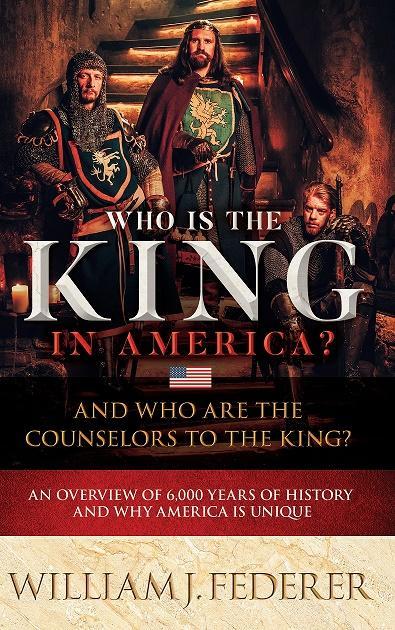Economist Milton Friedman stated:
"
Concentrated power is not rendered harmless by the good intentions of those who create it."

Over the objections of
Thomas Jefferson, James Madison, and
U.S. Attorney General Edmund Randolph, the
nation's first "centralized" bank was created on February 25, 1791.

Called the
Bank of the United States, it was a private institution founded with the help of
Alexander Hamilton.
Overseas foreigners were allowed to be stockholders in the Bank, though they were not allowed to vote.
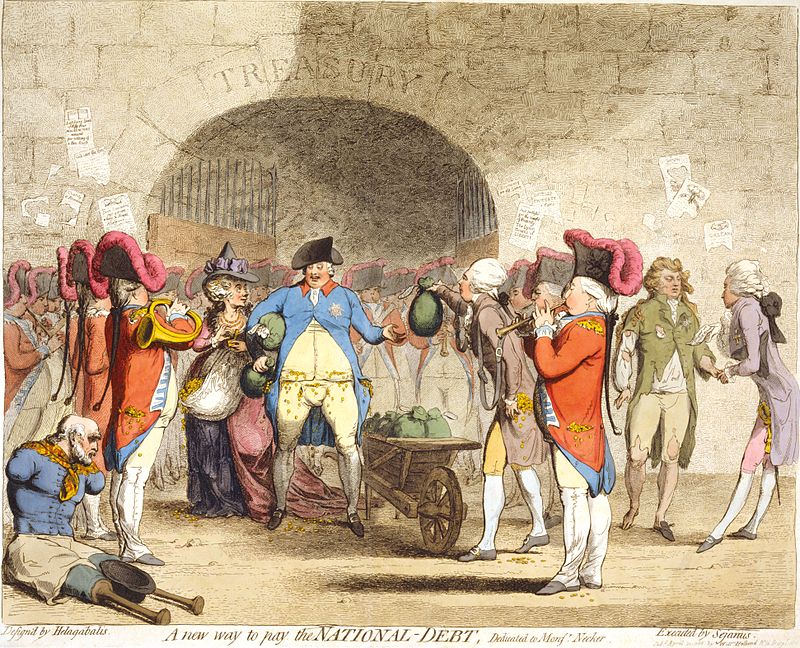
British Prime Minister William Pitt, whose nation's debt doubled to £243 million during the American Revolutionary War, stated:
"Let the American people go into their debt-funding schemes and banking systems, and from that hour their boasted independence will be a mere phantom."
Jefferson described the Bank of the United States "as a machine for the corruption of the legislature."
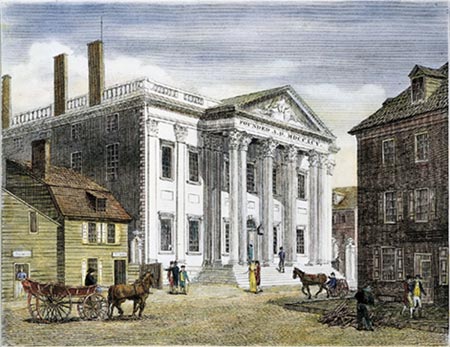
In 1811,
James Madison refused to recharter the Bank of the United States.
As British financiers reportedly owned two-thirds of the Bank's stock, this may have been a factor precipitating the War of 1812.
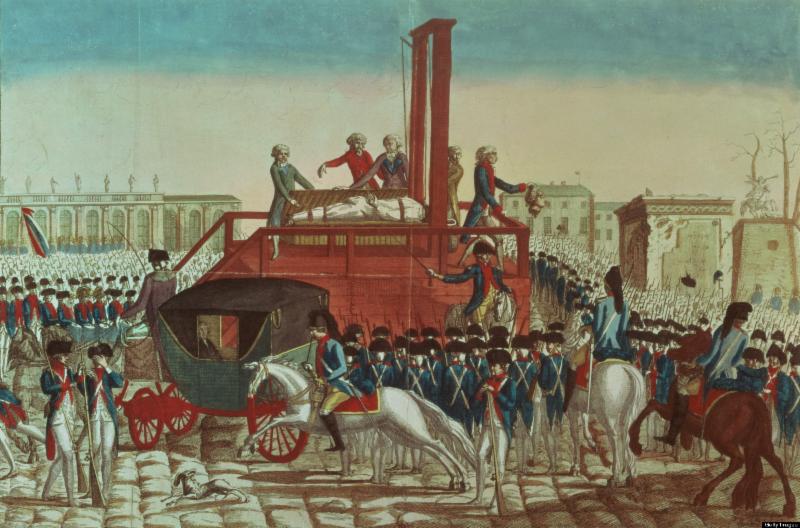
France incurred enormous debt helping America win independence from Britain.
This destabilized the country, leading to King Louis XVI being forced from the throne and then beheaded on January 21, 1793.
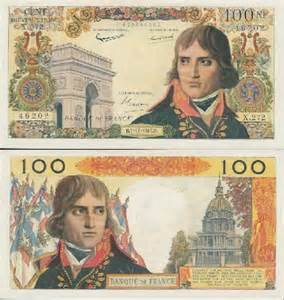
The French Republic was formed, but by 1799 it was bankrupt, setting the stage for Napoleon to take power.
R. McNair Wilson's book,
Monarchy or Money Power (1933), stated:
"It was ordained by Napoleon that money should not be exported from France on any pretext whatever except with the consent of the Government, and that in no circumstances should
loans be employed to meet current expenditure whether civil or military.
The object was to withhold from finance the power to embarrass the Government as it had embarrassed the Government of
Louis XVI.
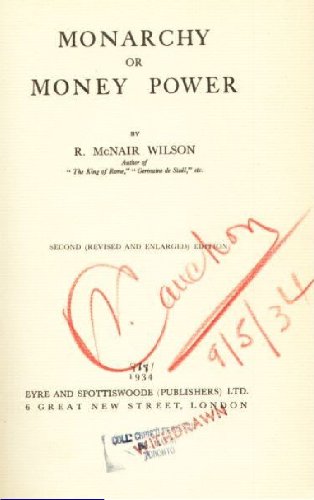
... When a Government, Bonaparte declared, is dependent for money upon bankers, they and not the leaders of that Government control the situation, since 'the hand that gives is above the hand that takes' ...
'Money,' he declared, 'has no motherland; financiers are without patriotism and without decency: their sole object is gain.'"
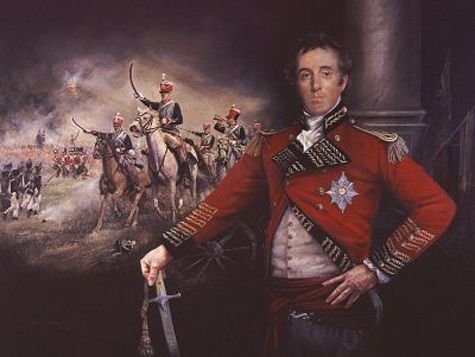 Nathan Rothschild
Nathan Rothschild helped fund the
Duke of Wellington's British armies against Napoleon in Spain and France.
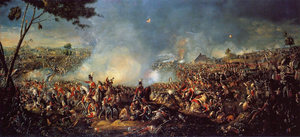
A legend persists that
Nathan Rothschild obtained early information of the British victory over
Napoleon at the
Battle of Waterloo, June 18, 1815.
Rothschild began to sell his shares on the London Stock Exchange, leading investors to suspect he had inside information that the British
lost the battle, resulting in panic-selling off of stocks.
The legend continued that he bought up devalued shares at low prices, and when news arrived the next day that the British had actually
won the Battle of Waterloo, the stock market enthusiastically exploded, resulting in Rothschild making a million pounds sterling in a day.
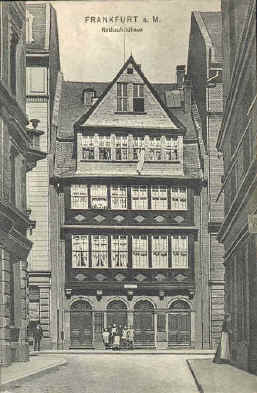
A maxim attributed to the
House of Rothschild was: "Let us control the money of a nation, and we care not who makes its laws."
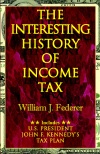 The Interesting History of Income Tax
The Interesting History of Income Tax
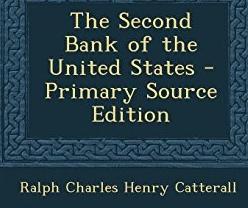
On April 10, 1816, the
Second Bank of the United States received its charter.
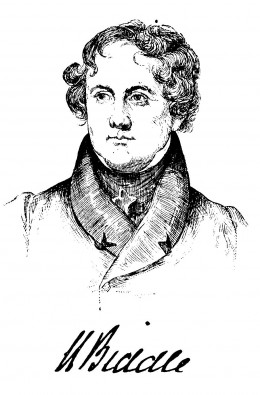
By 1822, the rechartered
Second Bank of the United States was run by
Nicholas Biddle who boasted of having more personal power than the President.
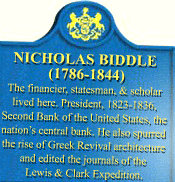 Nicholas Biddle
Nicholas Biddle set interest rates and reserve requirements, which allowed him to amass an enormous personal wealth.
 Nicholas Biddle
Nicholas Biddle bought political influence by
financing the election campaigns of politicians.
Biddle owned newspapers and would have them
editorialize and
sway voters during elections.
Ambitious politicians sought his money and his ability to provide favorable media coverage.
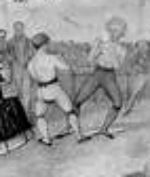
On JULY 10, 1832,
President Andrew Jackson vetoed the charter renewal of
Nicholas Biddle's Second Bank of the United States, stating:
"Some of powers and privileges possessed by the existing Bank are
unauthorized by the Constitution,
subversive to the rights of the States, and
dangerous to the liberties of the people ...
It is easy to conceive that
great evils to our country and its institutions might flow from such a concentration of power in the hands of a few men irresponsible to the people ...
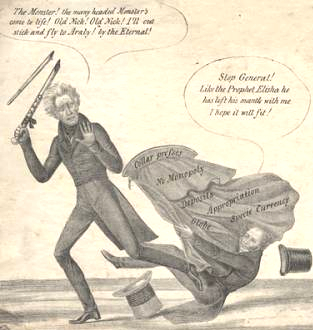
... Their
power would be great whenever they might choose to exert it ... to
influence elections or control the affairs of the nation.
But if any private citizen or public functionary should interpose to curtail its powers or prevent a renewal of its privileges, it cannot be doubted that he would be
made to feel its influence ..."
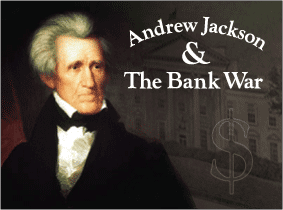
Andrew Jackson continued:
"
Controlling our currency, receiving our public moneys, and holding thousands of our citizens in dependence,
it would be more formidable and dangerous than the naval and military power of the enemy."
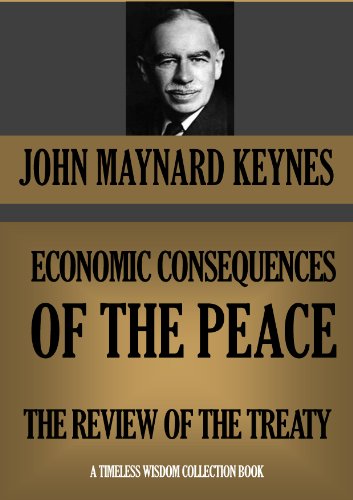 Economist John Maynard Keynes
Economist John Maynard Keynes held the same view, as he wrote in his book
The Economic Consequences of the Peace (1920, reprinted 1971, p. 235):
"Lenin is said to have declared 'The best way to destroy the capitalist system is to debauch the currency.'"
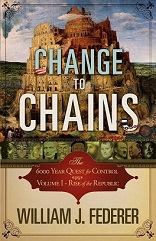 Change to Chains-the 6000 year Quest for Global Control
Change to Chains-the 6000 year Quest for Global Control
On September 18, 1833,
President Andrew Jackson decided to remove all Federal money out of
Nicholas Biddle's Second Bank of the United States:
"
The Bank is thus converted into a vast electioneering engine, with means to
embroil the country in deadly feuds, and ... extend its
corruption through all the ramifications of society ...
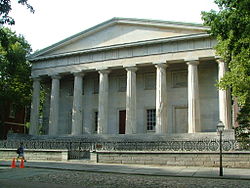
... The President would feel that he was ... an a
ccomplice in a conspiracy against that Government ...
if he did not take every step within his constitutional and legal power ... to ...
putting an end to these enormities ...
Was it expected when the moneys of the United States were directed to be placed in that Bank that they would be put
under the control of one man? ...
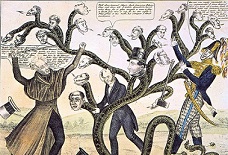
... This corporation now holds in its hands the happiness and prosperity of the American people,
it is high time to take the alarm.
If the
despotism be already upon us and our only safety is in the mercy of the
despot ... how necessary it is
to shake it off ...
One of the most serious objections to the Bank of the United States is
the power which it concentrates."
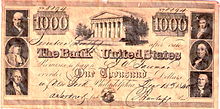
On December 3, 1833, in his 5th Annual Message,
President Andrew Jackson condemned
Nicholas Biddle's Second Bank of the United States:
"This great and
powerful institution had been actively engaged in
attempting to influence the elections of the public officers by means of its money ...
It being thus established by unquestionable proof that
the Bank of the United States was converted into a permanent electioneering engine ...
The efforts of the Bank to
control public opinion, through the distresses of some and the fears of others ...
Through presses known to have been sustained by its money
it attempts by unfounded alarms to create a panic in all."
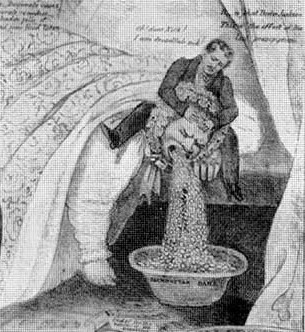 President Andrew Jackson
President Andrew Jackson, whose wife died right before he took office, stated in a Protest Message to the Senate, April 15, 1834:
"The Bank of the United States,
a great moneyed monopoly, had attempted to obtain a renewal of its charter
by controlling the elections of the people ... to
control public opinion and
force the Government to yield to its demands ...
The only ambition I can feel is to acquit myself to Him to whom I must soon render an account of my stewardship ...
to persuade my countrymen, so far as I may, that it is not in a ...
government supported by powerful monopolies ... that they will find happiness ... but in a plain system, void of pomp, protecting all and granting favors to none, dispensing its blessings, like the dews of Heaven."
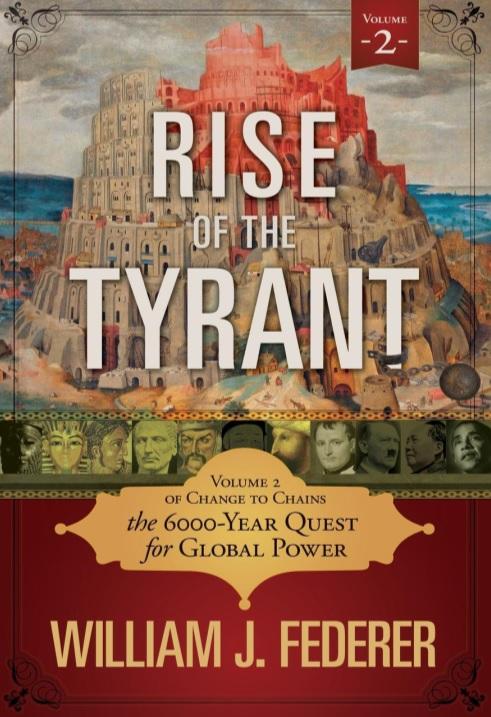 Get the book Rise of the Tyrant - Volume 2 of Change to Chains: The 6,000 Year Quest for Global Power
Get the book Rise of the Tyrant - Volume 2 of Change to Chains: The 6,000 Year Quest for Global Power
On December 1, 1834, in his 6th Annual Message,
President Andrew Jackson stated:
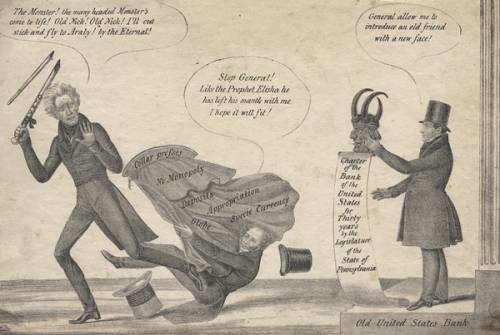
"Events have satisfied my mind, and I think the minds of the American people, that the
mischief and dangers which flow from a national Bank far overbalance all its advantages.
The bold effort the present Bank has made
to control the Government, the
distresses it has wantonly produced, the
violence of which it has been the occasion in one of our cities famed for its observance of law and order,
are but
premonitions of the fate which awaits the American people should they be deluded into a perpetuation of this institution or the establishment of another like it."
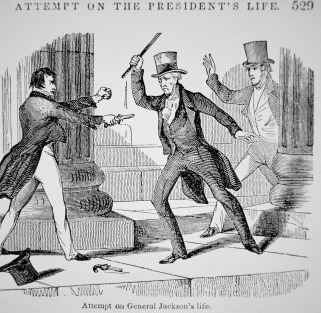
On January 30, 1835, in the midst of the
"Bank War," President Andrew Jackson survived
an assassination attempt when Richard Lawrence fired two pistols at him at point blank range.
Perhaps due to the wet foggy weather in Washington, D.C., the guns misfired.
 Davy Crockett,
Davy Crockett, who was with the President, ran up and wrestled the assailant, disarming him.
Senator Thomas Hart Benton wrote January 30, 1835 of how the incident:
"... irresistibly carried many minds to the belief in
a superintending Providence, manifested in the extraordinary case of two pistols in succession -- so well loaded, so cooly handled, and which afterwards fired with such readiness, force,and precision -- missing fire each in his turn, when leveled eight feet at the President's heart."
When
King William IV of England heard of the incident, he wrote expressing his concern.
President Jackson wrote back:
"A kind of Providence had been pleased to shield me against the recent attempt upon my life, and irresistibly carried many minds to the belief in a superintending Providence."
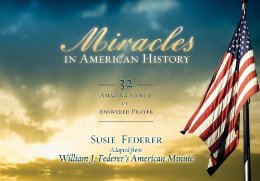
Miracles in American History-32 Amazing Stories of Answered Prayers
On December 7, 1835, in his 7th Annual Message,
President Andrew Jackson stated:
"We have felt but one class of these
dangers exhibited in the contest waged by the Bank of the United States ...
The Bank is, in fact, but one of the fruits of a
system at war with the genius of all our institutions ... whose great
ultimate object and inevitable result ... is the
consolidation of all power in our system in one central government.
Lavish
public disbursements and
corporations with exclusive privileges would be its
substitutes for the original ... checks and balances of the Constitution ...
Wherever this spirit has effected
an alliance with political power, tyranny and despotism have been the fruit ... It has to be incessantly watched, or it corrupts ...
All history tells us that
a free people should be watchful of delegated power, and should never acquiesce in a practice which will diminish their control over it."
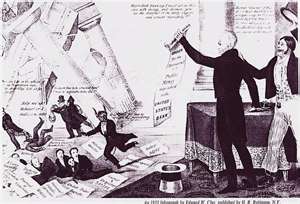
On December 5, 1836, in his 8th Annual Message,
President Andrew Jackson stated:
"It was in view of these evils, together with the
dangerous power wielded by the Bank of the United States and its
repugnance to our Constitution, that I was induced to exert the power conferred upon me by the American people to prevent the continuance of that institution ...
The lessons taught by the Bank of the United States cannot well be lost upon the American people. They will take care
never again to place so tremendous a power in irresponsible hands."
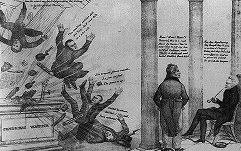
On March 4, 1837, in his Farewell Address,
President Jackson stated:
"The distress and alarm which pervaded and
agitated the whole country when the Bank of the United States
waged war upon the people in order
to compel them to submit to its demands cannot yet be forgotten ...
The
Government would have
passed from the hands of the many to the hands of the few, and this
organized money power from its
secret conclave would have
dictated the choice of your highest officers and compelled you to make peace or war, as best suited their own wishes.
The forms of your Government might for a time have remained, but
its living spirit would have departed from it ..."
 Jackson
Jackson continued:
"The distress ... inflicted on the people by the Bank are some of the fruits of that system of policy which is continually striving to
enlarge the authority of the Federal Government beyond the limits fixed by the Constitution ...
The
power which moneyed interest can exercise, when concentrated under a single head and with our present system of currency, was sufficiently demonstrated in the struggle made by the Bank of the United States ...
The paper-money system and its natural associations --
monopoly and exclusive privileges -- have already struck their root too deep in the soil, and
it will require all your efforts to check its further growth and to eradicate the evil ..."
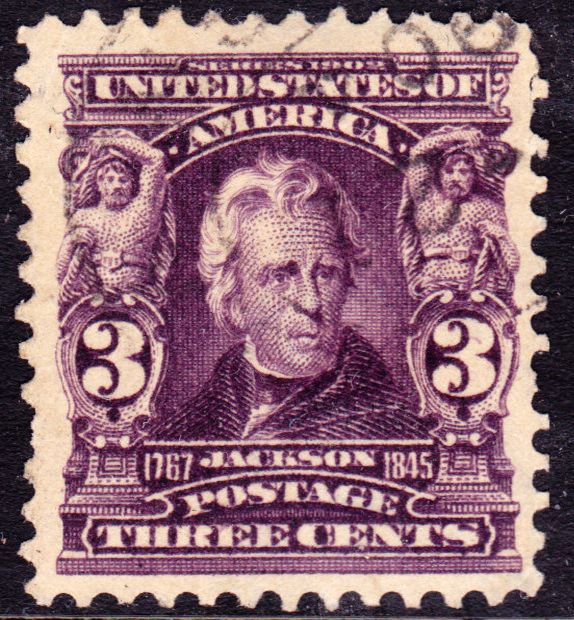 Jackson
Jackson continued:
"
The men who profit by the abuses and desire to perpetuate them will
continue to besiege the halls of legislation in the General Government ... and will seek by every artifice to
mislead and deceive the public servants ...
You have no longer any cause to fear danger from abroad; your strength and power are well known throughout the civilized world ...
It is from within, among yourselves -- from cupidity, from corruption ... and inordinate thirst for power -- that factions will be formed and liberty endangered.
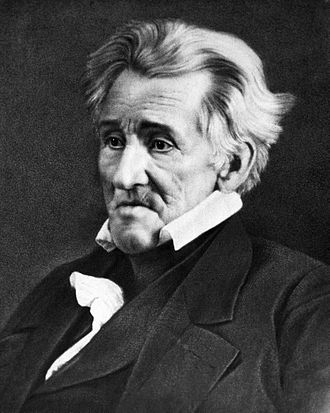 ... It is against such designs, whatever disguise the actors may assume, that you have especially to guard yourselves .
... It is against such designs, whatever disguise the actors may assume, that you have especially to guard yourselves ...
Providence has showered on this favored land blessings without number, and has chosen you as the guardians of freedom, to preserve it for the benefit of the human race.
May He who holds in His hands the destinies of nations, make you worthy of the favors He has bestowed,
and enable you, with pure hearts and hands and
sleepless vigilance, to guard and defend to the end of time, the great charge He has committed to your keeping."
